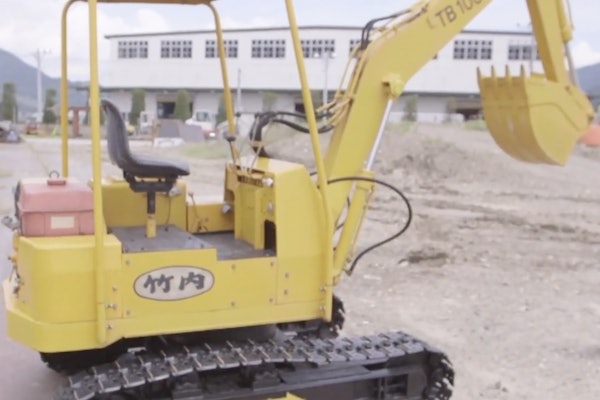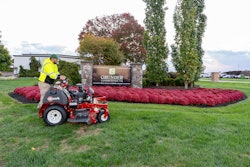 Properties designed by Kinghorn Gardens tend to not look like any other space around them.
Properties designed by Kinghorn Gardens tend to not look like any other space around them.Photo: Jill Odom
This is part one in a two-part series. The sequel article will publish on TLC tomorrow.
It seems only fitting that a landscaping company owner who first became interested in the green industry due to his family’s own gardens included the word “gardens” in his business’s name.
Bryan Kinghorn, president of Kinghorn Gardens, loved being in the garden growing up as it was a place for his family to enjoy each other’s company and he also took away important life lessons from working in the field.
 Bryan Kinghorn
Bryan KinghornPhoto: Jill Odom
“Some life lessons you learn in the garden,” Kinghorn says. “Like, if you don’t put forth any effort you’re probably not going to get very many results.”
Inspired by his father’s entrepreneurial spirit, Kinghorn decided to start his company in 1987 with nothing but a little blue S-10 pickup.
“I was at a point in my life where I was young enough that I could go ahead and try to make this happen and show some of that same independence and entrepreneurial spirit that my dad did and if by chance it didn’t work, I could recover,” he says. “I felt like I should take a shot at it because I’d always be disappointed if I didn’t.”
The Omaha, Nebraska-based company now employs around 45 to 48 people and has a fleet of about 19 vehicles.
The company’s clientele is generally 80 percent residential properties, but Kinghorn says this changes every year as they respond to opportunities. It services properties as far north as Sioux City, Iowa, as far east as Council Bluffs, Iowa, and as far west as Lincoln, Nebraska, but it occasionally travels even further.
“We try to serve clients who appreciate and value some of the same things that we appreciate and value,” he says. “Gardens are important places and important things happen in them and so I think hopefully we’re going to attract and want clients who value that. I think it’s important for you to recognize it’s meaningful to you and that it improves your outlook on things on your darkest of days or moments of greatest joy. They’re just great spaces to be in, I’m convinced of it.”
Kinghorn Gardens specializes in garden design/build, seasonal color and professional gardening with the goal to surprise and delight clients by creating green spaces that are unique and inviting.
“Our objective is to create beautiful spaces,” Kinghorn says.
Design philosophy
For Kinghorn Gardens, landscape design is all about respecting the space. Rather than trying to force certain elements, Kinghorn says it is important to value the place and draw inspiration from the site.
When meeting with clients to work on the design, a common question asked is “What’s that moment look like?” as a way to determine what the customer is wanting to experience in the space. This makes being a good listener key.
“I’m convinced that if you’re a good listener and you’re able to understand, not necessarily the content of what your client is trying to explain to you but the intent of what they’re trying to explain to you that you’ll end up with an outstanding design,” Kinghorn says. “Once you unroll the drawing or present the design solution they’ll recognize it right away as their own because it came from them.”
 This rooftop garden provides the client with a secret getaway.
This rooftop garden provides the client with a secret getaway.Photo: Jill Odom
Designers at Kinghorn Gardens make a point to deal with the elements first before focusing on anything else. Kinghorn says that often people don’t go outside because it’s too hot or too windy, so they create a backyard that appeals to the human need for shelter and privacy.
“The best way to help add to that design component is to make sure you get the fundamentals right,” he says. “Make sure you get the environmental components right, make sure you understand the personality and the style the client is in search of, and then you start to engage all of the other design principles that everybody gets trained on and practice.”
Kinghorn says they want to make the landscape habitable before adding interesting elements. When it is time to add the dynamic pieces, Kinghorn says it’s important that trending items such as pollinator gardens are not isolated but are worked into the entire space.
As for inspiration, aside from the site and the customer, Kinghorn stays up to date with what homeowners are being exposed to by purchasing books and magazines like Fine Gardening and Small Space Gardens.
“Open up the toy box,” Kinghorn says. “I’m always curious.”
Another part of Kinghorn Gardens’ design philosophy and general values is stewardship.
“The best definition of stewardship that I’ve come across is ‘stewardship is honoring what you’ve been given,’” Kinghorn says.
If the landscape is designed correctly, Kinghorn believes it can encourage others to take more interest in the environment.
“You take care of what you love and respect,” he says. “People might take more care of the environment if they were exposed to it more often.”
Yet stewardship doesn’t just relate to the environment in Kinghorn’s opinion. It’s about honoring your co-workers, as well as taking care of the equipment you’ve been entrusted with.
Customer relations
This concept of honoring what you’ve been given is even carried over to how Kinghorn Gardens interacts with its customers and potential clients.
Unlike some businesses that have moved from “the customer is always right” to a “firing difficult customers” mindset, Kinghorn doesn’t think this is the right attitude to have toward clients.
 Kinghorn Gardens works on both commercial and residential properties.
Kinghorn Gardens works on both commercial and residential properties.Photo: Kinghorn Gardens
“You’re in business to create customers,” he says. “You’re not supposed to fire them or say they aren’t spending enough. Your customers are why you are in business.”
Kinghorn says they are willing to plant a single tree, as even these customers can possibly become repeat clients.
As for knowing whether a potential client is a good fit, Kinghorn says he generally knows early on but strives not to turn down customers who could end up providing referrals.
He says they try not to have a property bias, as they want to provide nice spaces for all types of customers. While they might not be the cheapest company, Kinghorn Gardens will work with homeowners in phases, so they won’t have financial stressors and enjoy the ability to explore all of their design options.
Since majority of the company’s business is from word of mouth, Kinghorn works very hard to ensure that customers become ambassadors or friends of the company.
“We’re as good as our last job,” he says. “That’s how I really want us to do it. If we did our last job really well we’re going to have a lead.”
Check back tomorrow for part two of this article, where we’ll dive into the challenges that Kinghorn Gardens has faced along with its business advice.









